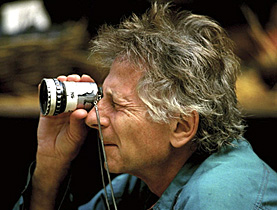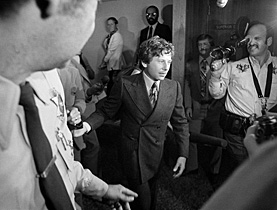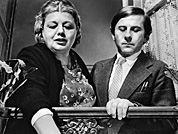Swiss deny Polanski’s appeal for freedom

Roman Polanski will stay behind bars for now after Swiss justice authorities on Tuesday rejected his first appeal to be released from jail.
Folco Galli, a Federal Justice Office spokesman, said no formal request had yet been received for the filmmaker to be sent back to California but that releasing him on bail in the meantime would not be appropriate.
“In our view, there is still a very high risk that he will flee,” he said. “A release on bail or other measure after a release cannot guarantee Polanski’s presence in the extradition procedure.”
The Academy Award-winning director was arrested on September 26 at Zurich airport en route to accept a lifetime achievement award from the Zurich Film Festival.
Polanski pleaded guilty to having unlawful sex in 1977 with a 13-year-old girl in the Hollywood Hills after plying her with champagne and part of a sedative. He fled the country shortly afterwards, never to return.
With him, against him
Polanski’s arrest has provoked a sharp reaction in Europe, where the case has polarised popular opinion.
On one side, some columnists and media pundits have argued the case has been all but settled, with even Polanski’s victim, Samantha Geimer, now 45, saying the filmmaker has been punished enough. Newspaper reports in Los Angeles this weekend quoted court documents showing that Polanski agreed in 1993 to pay Geimer $500,000 after she sued him in 1988.
Filmmakers and other artists have circulated petitions calling for his release. The Zurich Film Festival jury accused Swiss authorities of “philistine collusion” in arresting Polanski shortly before a ceremony commemorating his work.
Others, including Swiss justice authorities and several cabinet ministers, have vigorously defended the move, saying a crime is a crime no matter who you are and that Switzerland was legally bound by treaty to carry out the arrest.
While Polanski has spent many months at a time in Switzerland, including a long stretch this summer reportedly to work on his new film, The Ghost, the authorities have said this was the first time they had specific information on when and where the director would be.
More appeals
Polanski’s legal team has followed two parallel processes to secure his release. Although on the one hand the justice office has now rejected his appeal, another appeal lodged by his lawyers with the criminal court in Bellinzona is still pending. They have asked that he be placed under house arrest in Switzerland. Polanski owns a chalet in Gstaad.
The verdict by that court – which it has said it will give in the “next weeks” – can be appealed by either side to Switzerland’s highest court.
Should all fail, Polanski will be extradited to Los Angeles, where he faces a maximum of 50-years in jail. Since he already pleaded guilty, the case can never become so old that it has to be dropped.
Legal experts have said his chances of being released from jail while in Switzerland are slim, given the extraordinary nature of the case and the fact that Polanski, a French-Polish dual citizen, is not Swiss.
Other legal experts have said the director should go back to the US where he paradoxically has his best chance for winning his freedom.
“That is what I would tell him to do,” Laurent Moreillon, a law professor at Lausanne University, told swissinfo.ch in an earlier interview.
“Bad judgement”
Galli said he assumed having Polanski extradited was a “priority case” for US officials, who have considered him a fugitive since he fled to France more than 30 years ago. They have until late November to file a request to have him returned.
Polanski had originally been charged with six felony counts surrounding his encounter with Geimer during a model shoot for Vogue magazine. Transcripts from the grand jury trial that unfolded shortly afterwards depict the girl as sexually experienced but unwilling and frightened when Polanski continued his advances.
The director, who escaped Nazi-occupied Poland as a young man and in 1969 lost his heavily pregnant wife to a brutal murder, pleaded guilty to a lesser charge and underwent 42 days of psychological evaluation at a California state prison.
The New York Times reported last week that observers during that time found Polanski guilty of “bad judgement” but that he was not “a sexual deviate”. But when he faced the prospect of more time in jail, he fled the country on February 1, 1978, the day he was to appear in court for sentencing.
swissinfo.ch and agencies
Born Raymond Polanski to Polish-Jewish parents on August 18, 1933, he spent the first three years of his life in Paris before the family returned to Poland.
He escaped from the Jewish ghetto in Krakow in 1940 as the Germans sealed it off. His mother later died in an Auschwitz gas chamber.
His first full-length feature film after graduation, Knife in the Water, won a number of awards.
In 1969, Polanski’s pregnant wife, actress Sharon Tate, and six others were brutally murdered by followers of cult leader Charles Manson.
Polanski won a best director Oscar for The Pianist in 2003 as well as the Cannes film festival’s coveted Palme d’Or for the same film the year before.

In compliance with the JTI standards
More: SWI swissinfo.ch certified by the Journalism Trust Initiative




You can find an overview of ongoing debates with our journalists here. Please join us!
If you want to start a conversation about a topic raised in this article or want to report factual errors, email us at english@swissinfo.ch.